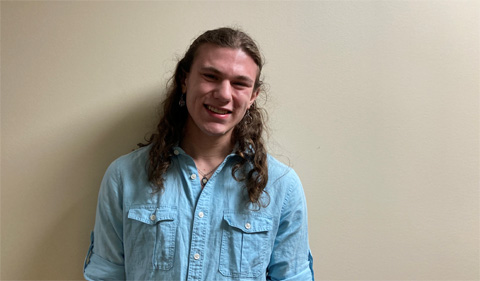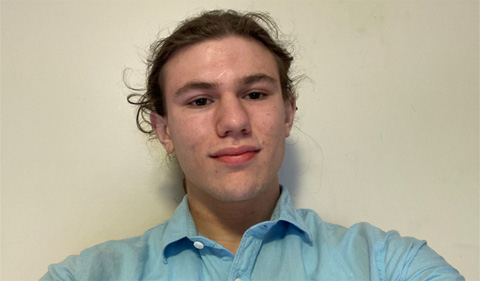Riley Rees received a Garden Club of America scholarship for a summer research project in John Schenk’s lab studying the evolutionary history of carnations.
Rees was awarded the 2022 Joan K. Hunt and Rachel M. Hunt Summer Scholarship in Field Botany for his project on Evolutionary History and Floral Traits of Angiosperms. The club funds scholarships to support field studies and opportunities for students to gain knowledge and experience beyond the classroom.
Rees in a second-year undergraduate student studying Environmental and Plant Biology in the Honors Tutorial College.
“This is a very competitive award from a national search,” said Schenk, Ph.D., assistant professor of Environmental and Plant Biology in the College of Arts & Sciences.
“Flowers, widely known for their beauty, are surprisingly complex. An especially compelling mystery within that is how petals evolved. This project hopes to look more in depth at that question through the lens of the carnation family of flowers. I selected carnations because current evidence suggests that they ancestrally lacked petals,” Rees explained.
“Currently, some flowers within the family lack petals while others have regained them, and many species have petals that develop inconsistently with traditional flowering plants. Some of these appear to be false petals that evolved from some of the male sex organs, known as stamen. Understanding the different forms of petals, and their evolutionary relationships, is at the core of this project.”
Rees’ first step will be developing a phylogeny, or family tree, from genetic information. So far, Rees has acquired 1,140 samples using GenBank, a collection of publicly available genetic information. This data covers most genera, or groups, in the carnation family. Those remaining groups will be acquired as samples and then analyzed. These can then be run through a computer modeling system to find the phylogeny that best fits.
“This in itself will be an accomplishment, as a complete phylogeny has never been published,” Rees noted. “Once this step is complete, the next will be to determine the petal structures of certain species. While many are known or can be inferred, identifying when and how different forms of petals occur will contextualize the evolutionary process at play. This will primarily be done by observing petals buds first forming, as the petals from stamen look like stamen buds during early development. Once the data has all been collected and interpreted, the project will likely lead to both publication and presentation.”
Q&A with Riley Rees
Q: Who are your favorite professors and how did they make an impact on your life?
A: Dr. Schenk has definitely played a major role in my life, helping me both learn how to do research and better understand the professional sides of academia and botany. I also really enjoyed working with Dr. Shawn Kuchta, as he helped me understand and become passionate about studying evolution.
Q: What was your ah-ha moment at OHIO—that point where you said to yourself, “I’ve got this!”?
A: I’ll let you know when I have one.
Q: What was the hardest hill you had to climb (not counting Jeff Hill) at OHIO? And how did you overcome challenges or obstacles in your path?
A: Staying on top of my workload, especially when I was feeling burnt out during COVID, has definitely been challenging. I try to balance schoolwork with spending time with my friends and take tasks one at a time as they come. It’s important to celebrate the little victories.
Q: What are your favorite OHIO memories?
A: Most of my favorite OHIO memories are just spending time with my friends. Especially freshman year, when none of us knew many people, and were all stressed out from online classes, it was really nice to have a game night, or make pancakes in the dorm kitchens, or even just sit down together to watch a movie.
Q: What’s the one thing you would tell a new OHIO student not to miss?
A: Obviously you shouldn’t miss your classes, but also try not to miss out on the other opportunities that are available. The people at OHIO, both faculty and students, care a lot about this community. Always take advantage of opportunities to engage with people, whether that’s a club that sounds interesting, or a colloquium in an area that interests you.





















One Comment